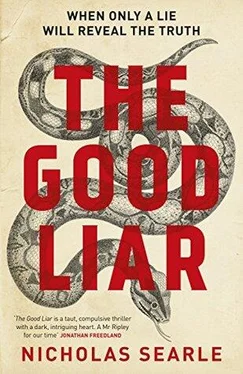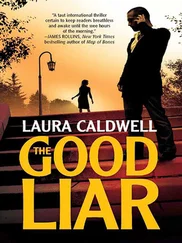and food had become still shorter in supply. The numbers of people
daily taken from work details and sent to the looming grey building with the four chimneys increased. And then things slowed down and
the guards seemed to adopt a kind of grimacing lassitude.
Their numbers gradually dwindled until in the middle of one
night the camp was alive with the sound of starting motors and
businesslike shouts. The inmates watched as the commandant and
final guards drove off into the dark forest that surrounded the
barbed wire.
Still they did nothing but wait. There was no food but no one
broke into the kitchen compound or the barracks that the guards
had inhabited. They were accustomed to days without food.
It was three days before the first British jeep drove by, its
230
1ST_9780241206935_TheGoodLiar.indd 230
05/05/15 5:32 PM
occupants seemingly so stunned that they simply sat in their seats, then drove away quickly. Later that day salvation, or as close to it as can be achieved in this world, came to them. Elisabeth would later
remember the waiting more than the days after the British opened
the gates.
She was fortunate enough to have contracted typhus. When they
were liberated, the British brought bread and cheese and meat,
plundered from the nearest town. They knew no better, and nor did
the prisoners as they gorged on the rich food. Several died as their digestive systems failed to cope with the abundant proteins and fats that now filled their bellies. Elisabeth, on the other hand, had no appetite.
It was not, for her at least, a joyous time. She could remember a
deep depression falling on her during the time she spent in the military hospital. This was release, then; but she was so numbed that
she could not feel happy. Nor could she feel sad. The weight of
events and the inhumanity she had witnessed crushed her.
It was several months before she discovered, at first tentatively
and then with more certainty, the fates of her parents and sisters.
Albert Schröder had been found guilty of treason. Magda was con-
victed as his accomplice. Both were executed. This much was on
record. What had happened to her sisters was never firmly estab-
lished. The records were not clear on events immediately after
the detention centre and subsequent traces were fragmentary. She
knew beyond doubt that at some stage they had perished in
the camps, a fact established by omission. They were not among
the survivors whose identities were carefully logged by the Allies.
Elisabeth had retained only slight hope that they might still be
alive. When she discovered the likelihood was negligible she found
it impossible to grieve. To all intents and purposes they had died the moment she was parted from them and their corpses had been
added to the towering pile she had witnessed. She did not feel shame at her coldness. She felt the coldness.
In May 1946 she left the displaced persons camp near Hannover,
boarded a train that took her to Ostend and then took a boat across 231
1ST_9780241206935_TheGoodLiar.indd 231
05/05/15 5:32 PM
the Channel. She was being sent to England and as she boarded the
vessel in a warm spring breeze she felt excitement, and no guilt.
7
Elisabeth Schröder was of an awkward age, no longer a child but
not yet an adult. She was placed in the care of John Barber, a don
who had recently arrived back at Pembroke College in Oxford after
his war service, and his wife, Eleanor. In flowing white nightdresses and dressing gowns, her long grey hair hanging loose and free, Eleanor haunted the corridors of the large Jacobean house day and night like a thin silver wraith. She was a kindly woman, but shortly after Elisabeth had joined the Barbers Eleanor was diagnosed with ovar-ian cancer. It was clear that death was upon her. Elisabeth felt no embarrassment at its presence and the Barbers were gently candid.
This did not prevent John Barber from pacing the rooms of the
house in soft despair, as if somewhere he could find the solution to all this, an expression of puzzlement and distraction on his plump, florid face. He tried to do his crying in private, though more than once Elisabeth found him in the library or the boot room, lost,
weeping as he stared through the mullioned windows.
John and Eleanor Barber were childless, unaccustomed to the
presence of young people in their home. This suited Elisabeth, who
did not want to be treated as anything other than a stranger. The
draughty old house was large enough for the three of them to pass
a day without meeting one another. As she recovered her sense of
self, this was what Elisabeth needed.
The intention had been that the Barbers should familiarize her
with life in England. She had not a word of English, so the place-
ment with an academic who specialized in the German Romantic
novel would be advantageous. The middle- aged couple would teach
her, care for her and help build her confidence.
In the event it was she who cared for them as they stared at the
vortex of what was to come and took their first tentative steps into it. Eleanor’s condition became rapidly worse. It did not minutely
232
1ST_9780241206935_TheGoodLiar.indd 232
05/05/15 5:32 PM
trouble Elisabeth to tend for her, spending nights soothing her as
she writhed in pain, fetching and carrying, and calmly clearing the mess of her foul bodily excretions as she descended further into the hell of her final months. Nor did what was to come concern Elisabeth. She knew death intimately, and it was not to be scorned or
feared. It simply was.
At the same time she learned again how to be a human being.
She rediscovered compassion. When Eleanor Barber died at the end
of the long winter of 1947 Elisabeth was more affected than she had imagined she would be. The thousands of deaths of which she was
directly aware during the war, the hundreds she had witnessed at
close quarters: these had not evoked similar feelings. For this she was annoyed with herself, but in the midst of his own grief John
Barber said gently that at least she could once again feel.
It was in 1950 that she thought about university. She wanted ini-
tially to apply for a place at Oxford so that she could continue to live in the house with John Barber, but he blocked the idea. One afternoon he made a pot of tea and sat with her in the drawing room,
unembarrassed but hesitant.
‘My dear, I’m afraid I must insist you study elsewhere. The idea
of you studying here at Oxford is simply out of the question. You
need to discover a life beyond this house, a life of your own, and you cannot be tied to me. And for my part, if you do remain it is almost inevitable that I shall form an attachment to you that borders on
inappropriate.’
She laughed and said, ‘John, don’t be so silly.’
‘No. I may be fat and fifty- three years old, but sadly I do continue to have such feelings.’
‘But John, you’re such a lovely man.’
‘I think if you knew me better you might revise that opinion. It is certainly one I do not share. I wish it were otherwise.’
‘I’ll be so upset if you send me away.’
‘As no doubt shall I. But I’m sure it’s the best thing for you. To
discover a wider life. To see new horizons. Become truly independ-
ent. And it will be better for me. We’ll see each other between
terms. If, that is, it’s what you want.’
233
1ST_9780241206935_TheGoodLiar.indd 233
05/05/15 5:32 PM
‘You know it will be.’
She hid her offended feelings, perversely pleased at the sensation
Читать дальше










![Nicholas Timmins - The Five Giants [New Edition] - A Biography of the Welfare State](/books/701739/nicholas-timmins-the-five-giants-new-edition-a-thumb.webp)

